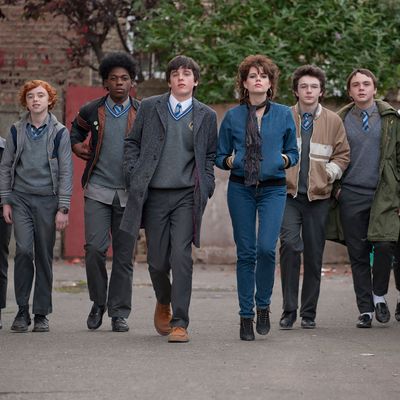
Before his latest film premiered at Sundance Sunday night, director John Carney talked briefly about what the festival has meant for him over the years. Back in 2007, his ultra-low-budget Irish musical romance Once seemed to come out of nowhere to charm Sundance audiences, going on to become a sizable indie hit. Carney recalled that, at the time, he had been living in his parentsÔÇÖ basement. At a dead-end and unsure what to do next, he wound up scraping together enough money to make that film┬áÔÇö a rough-edged musical romance on the streets of Dublin between two down-and-outers┬áÔÇö and wound up having his life transformed.
That provided an interesting bit of context going into Sing Street. Carney makes crowd-pleasers, and his new film was duly met with a rapturous response. But these films are crowd-pleasers because of that edge of desperation he brings to them┬áÔÇö the same kind of desperation that evidently led him to make Once. These are movies about troubled people┬áÔÇö sometimes at the end of their rope┬áÔÇö who find transcendence and connection in music.
Carney remains true to that idea in Sing Street right from the opening scene, which finds glum Dublin teen Conor (Ferdia Walsh-Peelo) strumming a guitar while his parents shout at each other in another room. Unable to shut out the noise, he starts to turn mom and dadÔÇÖs insults into lyrics. ItÔÇÖs the mid-1980s and Ireland is in the midst of economic doldrums. ConorÔÇÖs family has been forced to make financial sacrifices, so now he has to switch schools. Run by the Christian Brothers, Synge Street┬áÔÇö a real Dublin school that Carney himself attended, and which a note in the end-credits assures us is no longer in any way like itÔÇÖs portrayed in the film┬áÔÇö seems to be a rough-and-tumble hellhole, at once authoritarian and anarchic. The principal is abusive, bullies administer daily beatings in the yard, the canteen looks like a holding pen, and nobody seems to be learning anything.
Carney shoots all this with an exaggerated sense of grit: His camera pans in slow motion across the faces of the other kids on Conors first day of school, and we see little boys glowering, spitting, smoking, muttering at the camera. Its dark, but in a tongue-in-cheek way. In fact, it feels almost like a music video, the then-newly resurgent form that gives Sing Street its unlikely anchor. Look at it, Conors older brother Brendan (Jack Reynor) says, in awe of Duran Durans Rio on the TV screen. The perfect mixture of music and visuals  What tyranny could stand up to that?
What tyranny, indeed. Conors oppressive life turns around the day he spies beautiful, aloof, stylish Raphina (Lucy Boynton) standing across the street from his school. Though nervous, he approaches her. She says shes a model. He says he needs someone to star in his bands music video. Before he knows it, Conor has her number  and he needs to start a band, and write a song. Together with Darren (Ben Carolan), the one kid at school wholl talk to him, he sets about trying to find other musicians, and lucks out when Darren introduces him to Eamon (Mark McKenna), who can play every musical instrument imaginable.
The kidsÔÇÖ band, now called Sing Street, is rough, but their musicÔÇÖs charming. As they sing, they become more confident and polished before our very eyes. Conor, now dubbed Cosmo, starts to come to school dressed like whoever his musical influence is that day: Duran Duran, the Cure, Spandau Ballet. His relationship with Raphina, who has an on-again, off-again boyfriend, develops. His older brother Brendan goes from household irritant to musical and romantic mentor. (When Conor tells Brendan that Raphina has a boyfriend, he asks, ÔÇ£WhatÔÇÖs he listening to?ÔÇØ ÔÇ£Genesis.ÔÇØ ÔÇ£He will not be a problem.ÔÇØ) And as his ears and mind open up to the music, ConorÔÇÖs eyes open up to the world: He starts to better understand his parents, his friends, Raphina, even the bullies at school.
Though Sing Street is much more stylized and broad than Once, it remains true to CarneyÔÇÖs fondness for grounded fantasy. He doesnÔÇÖt go for easy melodrama, nor does he go for wish-fulfillment, making-the-band stories about finding glory and fame. Even as the film becomes more stylized and fantastical during its musical passages, weÔÇÖre constantly reminded that thereÔÇÖs a far more complicated, melancholy world out there. At one point, Conor and Brendan watch their mom sitting outside, enjoying the dayÔÇÖs last brief bit of sunlight, smoking and having a glass of wine. She rushes home from work at the end of each day just to catch that moment, weÔÇÖre told; itÔÇÖs a far cry from the trip to Spain she always dreamed of, but for now, itÔÇÖll do.
Sing Street is far more boisterous and certainly funnier than Once, but it remains in a minor key; ÔÇ£finding happiness in sadness,ÔÇØ is how one character puts it. And not unlike Once, it even closes on an open-ended note. Yet, thereÔÇÖs still triumph in it. Music may not realize all our wishes, Carney seems to say, but it does something perhaps even more important: It allows us to dream bigger.


